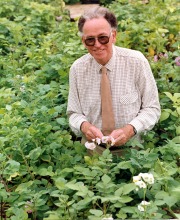Keynote Blogger: Anne Madden, Education Coordinator, Memorial University of Newfoundland & Labrador Botanical Garden
Composting your yard and kitchen waste doesn't have to be expensive or inconvenient; believe it or not, it's not really that hard. A compost bin can be as simple as a chicken-wire enclosure or a hole dug in the ground. You can even enlist the help of red-wiggler worms to create compost year-round, in the comfort of your own home. And for those people who are hesitant to give it a try, it is important to keep in mind that composting is a natural process. Microorganisms, insects, and worms help decompose (break down) dead plants and animals, returning the nutrients to the earth so that other plants may grow. When we compost at home and work, we are simply utilizing these natural processes. Having said that, some basic information will help get you started, while avoiding some common mistakes. But the best way to learn is to give it a try.
MUN Botanical Garden was, in part, created with compost. We have been composting leaves and other organic matter to help create our garden soil since 1971. In addition to enhancing the soil, composting also has many other environmental benefits. For example, soil created from compost is full of organic matter. When organic matter is added to soil, as in the case of adding compost, it helps soil hold or retain water. In other words, you will not have to water your garden as much or as often.
In Newfoundland, one of our biggest challenges (besides the weather), is locating local information which is relevant to our somewhat unique climate. For example, most sources of compost information recommend placing an outdoor bin in a location that will get shade in the afternoon. Here on the eastern Avalon Peninsula, we actually recommend the opposite; it is best to place your bin in the sunniest and warmest location you can find!
Interested in learning more about composting? MUN Botanical Garden has produced a series of leaflets on composting, including information on vermicomposting or worm composting. These leaflets are posted on our website http://www.mun.ca/botgarden/plant_bio/compost/. The Botanical Garden also offers a variety of school and family programming which encourages composting and we even celebrate composting every May during International Compost Awareness Week by offering free lunchtime lectures, family programs and more. Drop by the Botanical Garden some time and see for yourself how well compost works.
Happy composting!
***
Anne Madden is the Education Coordinator at the MUN Botanical Garden in St. John's, NL
www.mun.ca/botgarden







